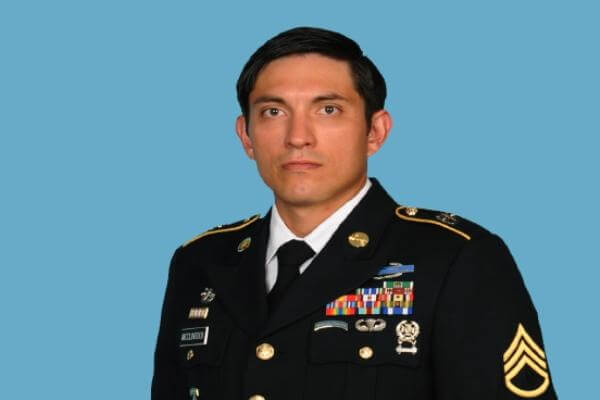The Pentagon has identified the U.S. Army Special Forces soldier killed on Tuesday in Afghanistan.
The Defense Department on Wednesday identified the service member as Staff Sgt. Matthew Q. McClintock, 30, originally of Albuquerque, New Mexico. A husband and a father of an infant son, he was assigned to the 1st Battalion, 19th Special Forces Group (Airborne), based in Buckley, Washington.
McClintock was killed during an extended firefight in Marjah in Helmand province "from wounds suffered when the enemy attacked his unit with small arms fire," according to a statement from the Pentagon.
He was the first U.S. service member to be killed in action in Afghanistan in 2016. Two other American troops were wounded during the operation to assist Afghan forces in taking back territory from a resurgent Taliban in the southwestern part of the country.
Two Air Force Special Operations HH-60 Pave Hawk helicopters were sent to evacuate the Americans from the Marjah firefight but neither was able to carry out the mission. One was waved off, possibly because of enemy ground fire and the second went down after a rotor blade reportedly struck the wall of an Afghan compound.
McClintock joined the Army in 2006 and served as a Special Forces engineer sergeant, according to the Washington National Guard. He deployed to Afghanistan in July with the Guard's A Company, 1-19th Special Forces Group.
Officials described him as a "hero" and "the best of the best."
"The death of any service member is tragic," Gov. Jay Inslee said in a statement. "The death of one of our own is especially difficult to grasp. My thoughts and prayers are with Staff Sergeant McClintock's friends and family, including his young wife and infant son. He is a true American hero who stood up to protect his state and nation. Trudi and I are deeply grateful for his service."
"Staff Sergeant McClintock was one of the best of the best," said Maj. Gen. Bret Daugherty, Washington National Guard commander. "He was a Green Beret who sacrificed time away from his loved ones to train for and carry out these dangerous missions. This is a tough loss for our organization, and a harsh reminder that ensuring freedom is not free. We stand with Staff Sergeant McClintock’s family, and will provide ongoing support during the grieving and healing process."
Last year, 27 coalition troops died in Afghanistan, including 22 Americans. That was the lowest casualty total for U.S. and coalition forces in the country since 2002.
The U.S. has about 9,800 troops in Afghanistan and plans to reduce that number to about 5,000 by the end of the year, as the mission in the country has shifted from conducting combat operations to primarily training, advising and assisting Afghan security forces.
The action in Marja came at a time when Afghan forces were seeking to reopen the road between Marja and the provincial capital of Lashkar Gah to the northeast in Helmand. Heavy fighting to the north in the Sangin district, which was a frequent battleground for Marines, had threatened the fall of Lashkar Gah, once the headquarters for British operations in the region.
--Richard Sisk contributed to this report.
--Brendan McGarry can be reached at brendan.mcgarry@military.com. Follow him on Twitter at @Brendan_McGarry.





























